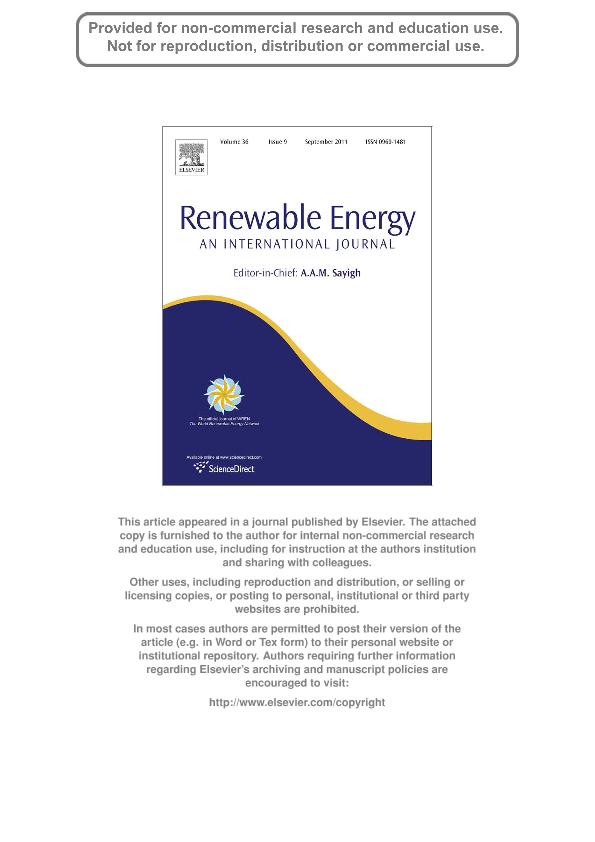Mostrar el registro sencillo del ítem
dc.contributor.author
Mesa, Nestor Alejandro

dc.contributor.author
Corica, Maria Lorena

dc.contributor.author
Pattini, Andrea Elvira

dc.date.available
2019-12-23T15:48:14Z
dc.date.issued
2011-09
dc.identifier.citation
Mesa, Nestor Alejandro; Corica, Maria Lorena; Pattini, Andrea Elvira; Evaluation of the potential of natural light to illuminate buildings in dense urban environment. A study in Mendoza, Argentina; Pergamon-Elsevier Science Ltd; Renewable Energy; 36; 9; 9-2011; 2414-2423
dc.identifier.issn
0960-1481
dc.identifier.uri
http://hdl.handle.net/11336/92741
dc.description.abstract
Cities display an array of microclimates closely related to the composition of their surfaces and the relationships among their structures. The effect of the shadow cast by a high-rise building is a simple case of this situation. The incidence of the shadow on other buildings or urban spaces can be positive or negative, according to the bioclimatic requirements of the place and season. The understanding of the cause of these effects is key information that helps when planning new urban complexes or refurbishing existing ones. Aiming at sustainable urban design, the building sector's energy efficiency, associated with bioclimatic design guidelines, is the most adequate way to achieve the desired goal and its consideration must be a priority in every situation where a high substitution potential of fossil by renewable energies exists, and it is available through control of the urban environment's morphology. To make the solar energy use feasible in urban environments it is necessary to incorporate design guidelines into building and urban normative as parts of integral planning by compatibilizing desirable levels of solar access with urban density and considering shape and orientation of parcels, buildings and streets. The paper presents the results of a study in Mendoza City, Argentina, on the daylighting potential in residential buildings, obtained through simulation and measurements "in situ" The electric energy consumed for lighting was analyzed, comparing different unit values for the apartments in the buildings of the city, considering their morphology and orientation. © 2011 Elsevier Ltd.
dc.format
application/pdf
dc.language.iso
eng
dc.publisher
Pergamon-Elsevier Science Ltd

dc.rights
info:eu-repo/semantics/openAccess
dc.rights.uri
https://creativecommons.org/licenses/by-nc-sa/2.5/ar/
dc.subject
BUILDING MORPHOLOGICAL
dc.subject
NATURAL LIGHT
dc.subject
URBAN PLANNING
dc.subject.classification
Diseño Arquitectónico

dc.subject.classification
Arte

dc.subject.classification
HUMANIDADES

dc.title
Evaluation of the potential of natural light to illuminate buildings in dense urban environment. A study in Mendoza, Argentina
dc.type
info:eu-repo/semantics/article
dc.type
info:ar-repo/semantics/artículo
dc.type
info:eu-repo/semantics/publishedVersion
dc.date.updated
2019-07-03T17:51:38Z
dc.journal.volume
36
dc.journal.number
9
dc.journal.pagination
2414-2423
dc.journal.pais
Estados Unidos

dc.journal.ciudad
Amsterdam
dc.description.fil
Fil: Mesa, Nestor Alejandro. Consejo Nacional de Investigaciones Científicas y Técnicas. Centro Científico Tecnológico Conicet - Mendoza. Instituto de Ciencias Humanas, Sociales y Ambientales; Argentina
dc.description.fil
Fil: Corica, Maria Lorena. Consejo Nacional de Investigaciones Científicas y Técnicas. Centro Científico Tecnológico Conicet - Mendoza. Instituto de Ciencias Humanas, Sociales y Ambientales; Argentina
dc.description.fil
Fil: Pattini, Andrea Elvira. Consejo Nacional de Investigaciones Científicas y Técnicas. Centro Científico Tecnológico Conicet - Mendoza. Instituto de Ciencias Humanas, Sociales y Ambientales; Argentina
dc.journal.title
Renewable Energy

dc.relation.alternativeid
info:eu-repo/semantics/altIdentifier/url/https://www.sciencedirect.com/science/article/pii/S0960148111000814/pdfft?md5=217671fa2afbe9052d304d7c63dbf3f6&pid=1-s2.0-S0960148111000814-main.pdf
dc.relation.alternativeid
info:eu-repo/semantics/altIdentifier/doi/https://doi.org/10.1016/j.renene.2011.02.005
Archivos asociados
